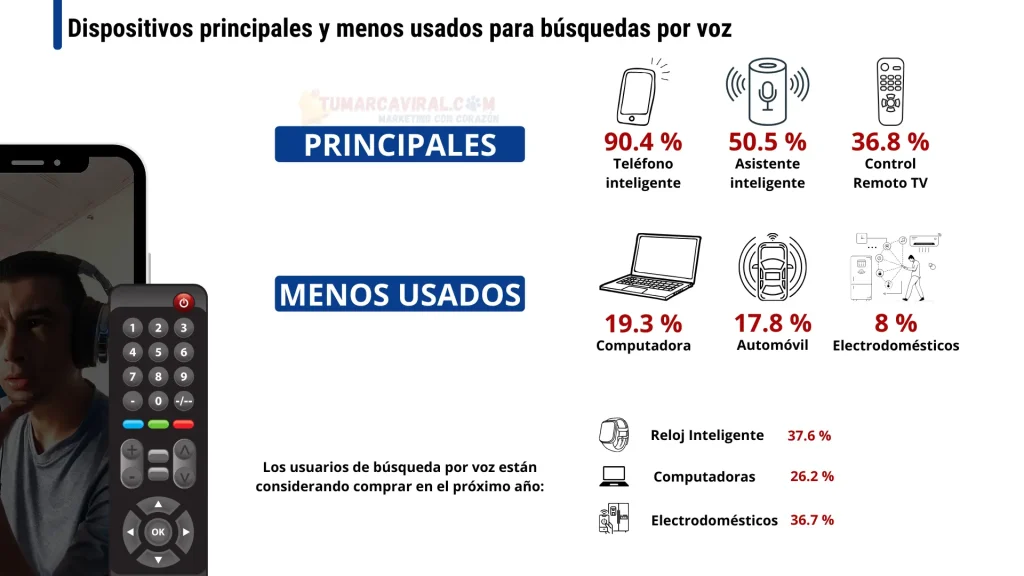Mastering voice search: optimizations and SEO strategies
Every day, millions of users turn to virtual assistants like Google, Alexa and Siri for quick answers and recommendations.
However, getting your content found on these devices is not a given. You need to adjust your keyword research, optimize on-page SEO and apply specific technical strategies to adapt to the particularities of voice search.
In this article, we'll explore how to achieve this. You'll see what sets voice search optimization apart, how to take advantage of its benefits, and I'll share six key recommendations to improve your ranking in voice search results.
Key Points
- Voice Search Optimization is a subset of SEO, focused on fine-tuning your website to improve its visibility in voice search results.
- To understand the impact of this technology, Ubersuggest surveyed 1,000 Americans between the ages of 18 and 65 who use voice search. The results revealed that nearly one-third (31.5%) of respondents use it daily or several times a day, underscoring its growing relevance.
- Implementing voice search optimization strategies not only increases traffic to your site, but also strengthens your overall SEO efforts, such as local SEO, and improves the overall user experience on your site.
- Optimize your website's SEO for voice search using these six strategies:
- Search for specific keywords for voice searchThese are usually long-tailed, more conversational and take the form of questions.
- Review your existing content before creating new contentIdentify opportunities to make your content more conversational, readable and optimized for specific voice search keywords.
- Optimize your content: Add more pronouns, avoid complex language and jargon, and answer as many questions as possible to improve voice search optimization.
- Improve your technical SEOAdd Schema Markup and make sure your site is more compatible with mobile devices to improve accessibility and indexing in voice search.
- Implement local SEO strategiesOptimize your presence on platforms such as Google My Business and Bing Places for Business to improve positioning in local voice searches.
- Monitor your resultsUse tools such as keyword tracking in Ubersuggest to measure performance and make adjustments to your voice search strategy.
See how my agency can generate more traffic to your website and automate all your internal processes.
Web DevelopmentWe create customized and optimized websites, designed to offer an exceptional user experience and enhance your digital presence.
Process Automation and Omni-channelingWe integrate solutions that automate tasks and connect all your communication channels to improve efficiency and interaction with your customers.
AdvertisingWe manage digital advertising campaigns to maximize your reach, increase conversions and improve your ROI on key platforms.
Email MarketingWe design and execute customized email marketing strategies, focused on increasing customer loyalty and boosting your sales.
What is voice search optimization?
Voice search optimization is a specialized branch of search engine optimization strategies. SEO (search engine optimization)but with a specific focus on improving your visibility in voice search results. This is a set of tactics designed to ensure that your website appears when users make queries through voice assistants such as Siri, Alexa o Google Assistant.
It is crucial to SEO for voice search because SEO strategies based on written content do not always translate effectively to spoken queries. Voice searches tend to be more conversational, natural and specific compared to written searches. While written queries tend to be short and direct, voice searches include longer, more detailed phrases, often phrased as questions. For example, a user searching for a local restaurant might query in the following ways:
- Written: "Restaurants near me".
- Voice: "What are the best restaurants near my location?"
This kind of difference in queries shows the need to adapt SEO strategies to meet the demands of voice search.
Adaptation of the search
In addition to keyword adaptation, technical aspects of the site also need to be improved, such as loading speed and compatibility with mobile devices. Voice searchers primarily use smartphones, smart assistants such as Alexa and, to a lesser extent, smart TVs and remote controls. According to a recent study, the 90.5% of users use their smartphones for voice searches, the 50% uses devices such as Alexa and the 36,8% searches through smart TVs.
These statistics highlight the importance of making sure your site is accessible on all of these devices. If your site is not optimized for them, you could lose a large portion of the traffic that comes from voice searches.
Optimizing for voice search also requires structuring your content in a way that clearly and concisely answers frequently asked questions, adapting to the conversational forms of voice search. For example, a written query such as "Yoga classes in Madrid" could become "Where can I find yoga classes near me?" in a voice search, which requires your content to be optimized to respond quickly and directly to those queries.
How has voice search evolved?
Voice search began to gain traction in 2011 with the launch of SiriApple's virtual assistant, led by the team from Dag Kittlausone of its creators. This breakthrough was followed by technologies such as Google Voice Search in 2012 and the introduction of Alexa by Amazon in 2014, designed by Rohit Prasad and Toni Reid, who pushed for its integration into homes through devices such as Amazon Echo. These first steps marked the beginning of a competition among tech giants to perfect voice recognition.
In the last few years, voice search has been consolidated thanks to advances in artificial intelligence y natural language processing (NLP)reaching accuracies above 95% for 2017, according to Google. Furthermore, in 2018, Sundar Pichai, CEO of Google, highlighted at its I/O conference that the use of conversational search was expanding rapidly, especially on mobile devices and smart assistants such as Google Assistant. This development also impacted local searches, with 50% of "near me" searches conducted via voice in 2020.
Today, voice search is a key tool for digital strategies. Companies and SEO experts have adapted their efforts to optimize conversational and local content, aligning with trends driven by these technologies. The future points to greater integration with IoT devices and more advanced personalization, keeping voice search relevant as an essential channel in digital marketing.
Benefits of voice search for SEO
Voice search has brought multiple benefits to SEO, transforming online positioning strategies and offering new opportunities to improve search engine visibility. Here are some of the main benefits
Boosting local searches
Voice search is closely tied to local searches. Queries such as "restaurants near me" or "pharmacies open now" are common, providing local businesses with an opportunity to optimize their presence on platforms such as Google My Business. According to recent statistics, the 50% of voice searches are related to local inquiries, allowing you to attract customers in specific locations.
Focus on natural language
Users tend to use more conversational language and complete questions when performing voice searches, such as "What is the best hotel in Cancun for families?". This benefits SEO by allowing content that is optimized with long-tail keywords and in the form of frequently asked questions (FAQs) are more likely to appear in the results.
Increased relevance in the highlighted responses
Voice search frequently displays direct answers to user queries through the use of featured snippets (featured answers). Optimizing content to provide clear and concise answers can increase the likelihood that your page will be selected as a top result, improving visibility and attracting more traffic.
Optimization for mobile devices
The majority of voice searches are performed from mobile devices, which has led to the prioritization of the responsive design and load speed optimization. By adapting your site to these requirements, you not only improve SEO for voice, but also the overall user experience, which is crucial for search engine ranking.
Competitive differentiation
Since many companies have yet to fully optimize their content for voice search, leveraging this technology can give you a competitive advantage. By creating strategic content that aligns with these types of searches, you can capture an audience that other competitors may be missing out on.
6 Tips for optimizing voice search
Focus on long-tail keywords and natural language.
Voice searches are more conversational and tend to be longer than typed searches. Optimize your content using long-tail keywords and phrases that mimic how people talk. For example, instead of "restaurants near", use phrases like "Where are the best restaurants near me?".
Create content based on frequently asked questions (FAQs)
Most voice searches start with questions like "What?", "How?" or "Where?". Design pages or sections on your website with frequently asked questions that directly answer your users' potential queries. Provide clear, concise and easy-to-understand answers to increase your chances of appearing in the search results. featured snippets.
Optimize your content for local searches
Since the 50% of voice searches are related to local queries, make sure your site is optimized for geolocated searches. Maintain your Google My Business updated with accurate information, such as address, opening hours and business category. Include local terms in your content to increase your relevance.
Improve the speed of your website
Voice search is dominated by mobile users, and Google prioritizes fast sites for these devices. Make sure your page loads in less than 3 seconds. Optimize images, reduce file size and use reliable hosting to improve load time.
Uses structured data (Schema Markup)
Structured data helps search engines better understand your content and present it effectively in search results. Implement Schema Markup to highlight key information such as hours, prices, reviews or locations, which can increase your visibility in direct responses to voice searches.
Optimized for mobile devices
Most voice searches are performed on smartphones, so your site must be fully responsive and easy to navigate on mobile devices. Conduct mobile usability tests and make sure the design is intuitive, with clear and accessible buttons.
BONUS: Be relevant and current
Quality content will always be a key factor. Make sure your site provides real value to the user, answering their questions clearly and completely, and keep up to date with trends in voice search and changes in Google's algorithms.
Conclusions
Voice search has revolutionized SEO, favoring natural and local queries thanks to the use of assistants such as Siri, Alexa and Google Assistant. Adapting content with long-tail keywords, FAQs and mobile optimization is key to stand out. In addition, integrating structured data and improving loading speed allows you to capture relevant traffic and increase visibility. Optimizing for voice search is not just a trend, but a necessity to stay competitive in a constantly evolving digital environment.




